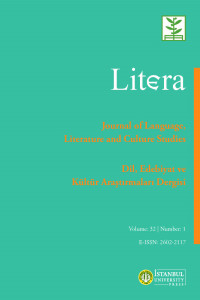Öz
Kaynakça
- Bogue, R. (2012). Deleuze and literature. In Daniel W. Smith and Henry Somers-Hall (Eds.), The cambridge companion to Deleuze (pp. 286-306). Cambridge, UK: Cambridge University Press. google scholar
- Crenshaw, K. (2005). Intersectionality and identity politics: Learning from violence against women. In W. K. Kolmar, & F. Bartkowski (Eds.). Feminist theory: A reader (pp. 533-542). McGraw-Hill. google scholar
- Deleuze, G. & Guattari, F. (1987). A thousand plateaus: Capitalism and schizophrenia (B. Massumi, trans.). Minneapolis: University of Minnessota Press. google scholar
- Deleuze, G. & Guattari, F. (1983). Capitalism and schizophrenia: Anti-Oedipus. (Robert Hurley, Mark Seem, Helen R. Lane, trans.) Minneapolis: University of Minnesota Press. google scholar
- Deleuze, G. & Guattari, F. (1986). Kafka: Toward a minor literature (D. Polan, trans.), Minneapolis: University of Minnesota Press. google scholar
- Henke, S. (1998). Shattered subjects: Trauma and testimony in women’s life-writing. New York: St. Martin’s Press. google scholar
- Jeon, Miseli. (2004). Multiculturalism?: Ten thousand sorrows: The extraordinary journey of a Korean war orphan by Elizabeth Kim. Canadian Literature, 181(Summer), 147-149. google scholar
- https://www.proquest.com/docview/218813575/3FD1DD7D135D4281PQ/46?accountid=14667. google scholar
- Kim, E. (2000). Ten thousand sorrows: The extraordinary journey of a Korean war orphan. New York: Doubleday. google scholar
- Oh, S. (2001). Ten thousand sorrows: The extraordinary journey of a korean war orphan by Elizabeth Kim. Western American Literature, 36(2), 194-195. www.jstor.org/stable/43025020. google scholar
- Riordan, R. J. (1996) Scriptotherapy: Therapeutic writing as a counseling adjunct. Journal of Counseling & Development, 74, 263-269. https://doi.org/10.1002/j.1556-6676.1996.tb01863.x. google scholar
- Smith, S. & Watson J. (2010). Reading autobiography: A guide for interpreting life narratives (2nd ed.), Minneapolis: University of Minnesota Press. google scholar
- Wood, T. D. (2008). Korean American literature: Literary orphans and the legacy of Han (Doctoral Dissertation). Available from ProQuest Dissertations and Theses. (UMI No. 3305668). google scholar
Ten Thousand Ways of Survival and Healing: Reading Ten Thousand Sorrows: The Extraordinary Journey of a Korean War Orphanas An Example of Minor Literature
Öz
Not only did Elizabeth Kim never meet her American father who impregnated her mother during the Korean War, but she also witnessed the murder of her mother who was the only family member she had. After her mother’s death, she was sent to an orphanage and was adopted by an oppressive and abusive American family who forced her to marry a man who turned out to be a schizophrenic and sadistic brute. Her traumatic experiences left permanent marks on Kim as she has suffered from prolonged depression and anxiety. Ten Thousand Sorrows: The Extraordinary Journey of a Korean War Orphan (2000) is Elizabeth Kim’s only book in which she details her encounters with death, violence, sexual abuse and rape. This article will analyze Kim’s memoir as an example of what Gilles Deleuze and Félix Guattari have called minor literature which is defined by the deterritorialization of language, a work’s political stance against oppression and its collective value. It will also discuss Elizabeth Kim as a deterritorialized character who eventually becomes a nomad. Taken through this framework, Ten Thousand Sorrows does not emerge as a cultural assimilation story, nor is it the breakthrough narrative of an oppressed minority woman. Rather, the book is Elizabeth Kim’s attempt to heal the wounds caused by the constant physical and spiritual abuse she had to endure throughout her life
Anahtar Kelimeler
Elizabeth Kim deterritorialization minor literature nomad Deleuze and Guattari
Kaynakça
- Bogue, R. (2012). Deleuze and literature. In Daniel W. Smith and Henry Somers-Hall (Eds.), The cambridge companion to Deleuze (pp. 286-306). Cambridge, UK: Cambridge University Press. google scholar
- Crenshaw, K. (2005). Intersectionality and identity politics: Learning from violence against women. In W. K. Kolmar, & F. Bartkowski (Eds.). Feminist theory: A reader (pp. 533-542). McGraw-Hill. google scholar
- Deleuze, G. & Guattari, F. (1987). A thousand plateaus: Capitalism and schizophrenia (B. Massumi, trans.). Minneapolis: University of Minnessota Press. google scholar
- Deleuze, G. & Guattari, F. (1983). Capitalism and schizophrenia: Anti-Oedipus. (Robert Hurley, Mark Seem, Helen R. Lane, trans.) Minneapolis: University of Minnesota Press. google scholar
- Deleuze, G. & Guattari, F. (1986). Kafka: Toward a minor literature (D. Polan, trans.), Minneapolis: University of Minnesota Press. google scholar
- Henke, S. (1998). Shattered subjects: Trauma and testimony in women’s life-writing. New York: St. Martin’s Press. google scholar
- Jeon, Miseli. (2004). Multiculturalism?: Ten thousand sorrows: The extraordinary journey of a Korean war orphan by Elizabeth Kim. Canadian Literature, 181(Summer), 147-149. google scholar
- https://www.proquest.com/docview/218813575/3FD1DD7D135D4281PQ/46?accountid=14667. google scholar
- Kim, E. (2000). Ten thousand sorrows: The extraordinary journey of a Korean war orphan. New York: Doubleday. google scholar
- Oh, S. (2001). Ten thousand sorrows: The extraordinary journey of a korean war orphan by Elizabeth Kim. Western American Literature, 36(2), 194-195. www.jstor.org/stable/43025020. google scholar
- Riordan, R. J. (1996) Scriptotherapy: Therapeutic writing as a counseling adjunct. Journal of Counseling & Development, 74, 263-269. https://doi.org/10.1002/j.1556-6676.1996.tb01863.x. google scholar
- Smith, S. & Watson J. (2010). Reading autobiography: A guide for interpreting life narratives (2nd ed.), Minneapolis: University of Minnesota Press. google scholar
- Wood, T. D. (2008). Korean American literature: Literary orphans and the legacy of Han (Doctoral Dissertation). Available from ProQuest Dissertations and Theses. (UMI No. 3305668). google scholar
Ayrıntılar
| Birincil Dil | İngilizce |
|---|---|
| Konular | Sanat ve Edebiyat |
| Bölüm | Araştırma Makaleleri |
| Yazarlar | |
| Yayımlanma Tarihi | 23 Mayıs 2022 |
| Gönderilme Tarihi | 26 Mart 2021 |
| Yayımlandığı Sayı | Yıl 2022 Cilt: 32 Sayı: 1 |


